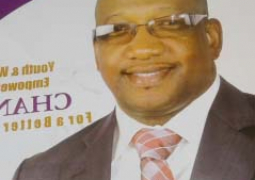
“HEALTH
Madam
Speaker,
Improvements
to water quality are linked to health outcomes across the country.
Alongside
providing people with safe drinking water and sanitation, my government,
through the Ministry of Health, is scaling up its efforts to improve our health
delivery systems, especially for women and children. As a first step, we have obtained additional
assets to support primary health care provision in the country. This includes
800 pedal bicycles and 29 motorbikes for Village Health Workers and Community
Health Nurses across the country’s seven health regions.
I
am pleased to report that the World Bank has approved US$7 million in
additional funding for the Maternal and Child Health as well as the Nutrition
Result Project. My government has also submitted a proposal to the EU to
enhance food security. We would welcome
their support to help us treat acute malnutrition and prevent all forms of
under-nutrition.
With
more than 95 percent coverage, we are also getting support from the Global
Alliance for Vaccine Initiative (GAVI) to help us consolidate our strong track
record on child immunizations. This project, estimated at US$4.6 million will
help strengthen and enhance our immunization systems.”
President
Barrow, July 24, 2017.
A
review of the president’s deliberation on health would conclude that it was
entirely based on primary healthcare which fortunately has been the most active
component of the Gambian health delivery systems since the first republic with
both the secondary and tertiary remaining as strugglers.
How
do we then as a nation improve the functions of the two other important
components of the health system?
At
a personal level and in consideration of the small size of our population, I
will suggest an emulation of the National health Service (NHS) UK and in this,
primary health care should be made free or next to free in order to make it
readily available as a measure of preventing disease burden while maintaining
it completely at Health Centre level.
Furthermore,
all the regional hospitals including Bundung Maternal and child (formerly
Jammeh Foundation) hospital be upgraded into proper general hospitals to
provide affordable secondary care for each administrative region with
Polyclinic serving as a secondary care service centre for Banjul.
And
the Edward Francis Small Teaching Hospital and Serrekunda General Hospital can
then be given full autonomy to be managed by their own independent
administrations and as well upgraded as proper and well equipped tertiary
hospitals for Medical & Surgical and Maternal & Child Care
respectively.
However,
the care at the tertiary level should be purely advanced specialist paid for
services in order to meet their maintenance cost and most be made adequate and
readily available by the respective hospitals.
This
will help decongest both hospitals in terms of capacity needs and as well
reduce the burden related to demand overriding supply which has always been the
cause of deficit in services rendered at the tertiary level.
Moreover,
to prevent the stagnation of the health personal (doctors and nurses)
particularly doctors, the Medical and Dental council can restructure the
internship program for graduates of the medical school into two phases; a one
year 3 monthly rotation at the teaching hospitals and a year rotation at the regional
hospitals.
This
can come with three benefiting results;
1
- it will reduce the expenditure relating to increased staff capacity of the
teaching hospitals thus creating funds for the improvement of other areas of
the hospitals.
2
- it will improve performance by creating competition for those doctors/nurses
that may want to return to the tertiary hospitals at the end of their regional
hospital rotations.
3
- it will broaden and enrich the experience of those posted doctors and nurses.
How
can we improve the human resource capacity to maintain the functionality of
these systems?
It
is commendable to say that the country has trained many doctors, nurses, public
health officers and other cadres. However, in health, training without
specialisation is synonymous to building a multipurpose house without
furniture.
Hence
the need to graduate the government’s concentration from undergraduate to
postgraduate training with diversification of specialty for both doctors and
nurses while creating attractive incentives for those abroad to return and
contribute in the strengthening of the existing systems.
And
to avoid brain drain, flexible bonds with as well incentives should be attached
to postgraduate training grants which can be gained through bilateral and multilateral
cooperation with countries like Nigeria, Turkey, India, Senegal, China etc thus
instead of building a $50M conference centre or a $48M forensic lab for
example, these funds can be used to train 10 -15 specialists whom in 5years
upon their return can save the government more than the amount spent on their
training.
It
is therefore paramount for the government to work on redirecting its foreign
aid policy from monetary to human resource development which will thus prevent
the drainage of funds into unknown wells and as well reduce corruption.
Dr
Muhammed Teks Tekanyi, USA



